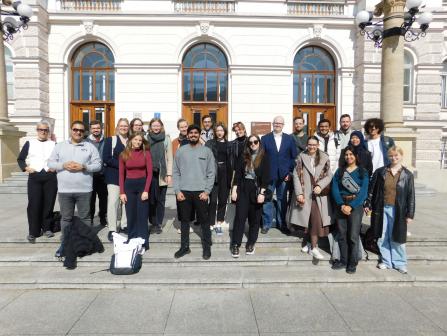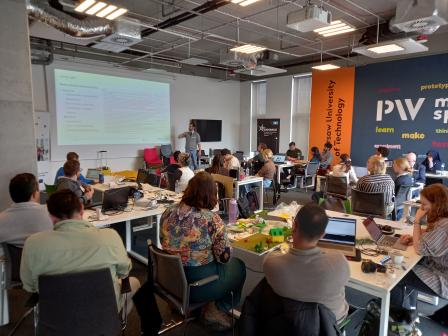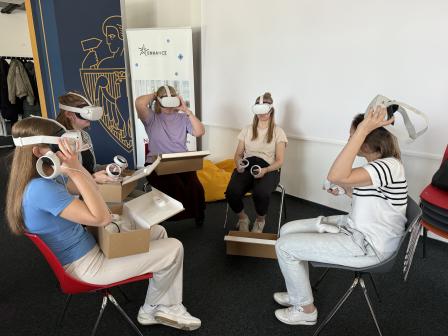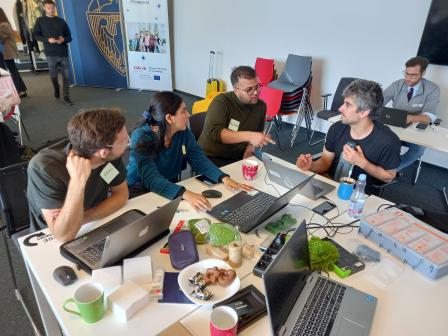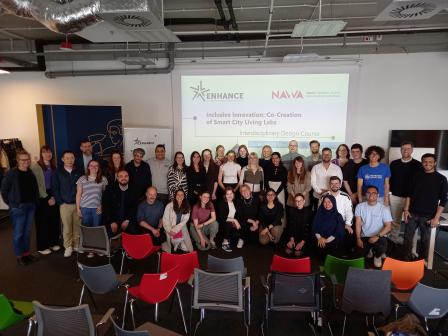The ENHANCE Workshop on Co-creation of Smart City Living Labs at WUT
On 19 May 2025, the inauguration of the on-site Interdisciplinary Design Classes for Students from the ENHANCE Alliance INCLUSIVE INNOVATION CO-CREATION OF SMART CITY LIVING LABS workshop took place. The event was organised by Warsaw University of Technology in cooperation with the Norwegian University of Science and Technology (NTNU) and the Technical University of Aachen (RWTH). The course was a 5-day event in Warsaw at WUT from 19th to 23rd May 2025, thanks to NAWA funding, with an online part: 7th March + 21st March and 25th April 2025. The workshop was attended by 31 students from 9 universities from the ENHANCE Alliance and 7 countries (Spain, Netherlands, Germany, Norway, Poland, Sweden, and Italy).
Download pictures: PHOTOS_CO-CREATION OF SMART CITY LIVING LABS_2025
Check out interviews with participants:
Julia_UPV
Maxim_TUB
Navid_UPV
Sana_TU DELFT
The inauguration was attended by Agnieszka Wendland Ph.D. - the main initiator & organizer of the workshop - from the Department of Cartography at the Faculty of Geodesy and Cartography Stefan John, Ph.D. from RWTH Aachen (Living Labs Incubator), Anna Rolewicz-Kalińska Ph.D., Faculty of Building Services, Hydro and Environmental Engineering, and Piotr Szczepański from the Centre for International Cooperation.
The goal of the hybrid design course was to develop people-centred products and processes by using state-of-the-art technology to implement Living Lab in your cities. The course aimed to conduct an experiment with a chosen technology that could be part of the living lab's operation. During the workshop, students explored concerns about diversity (along with what this means for inclusivity and equity) in Smart City Development.
Day 1 – 19th May 2025
The workshop began with a warm welcome and a group photo at the Warsaw University of Technology. Participants then moved to Rektorska 4 for an introductory co-creation session titled “Co-Create & Iterate,” focusing on collaborative prototyping. Guidance was provided by AI and social research experts. After lunch, teams refined ideas during consultations. The day concluded with “Free Creation Time,” supported by AI expert Kamil Choromański. The day successfully set the stage for interdisciplinary collaboration, encouraging participants to merge creativity, technology, and social insight in developing smart city solutions.
Day 2 – 20th May 2025
Day two deepened participants' understanding of smart city innovation. It started with continued prototyping and technical support from electronics expert Piotr Pałka. The highlight of the morning was a Business Model Canvas workshop led by Łukasz Sztern, helping teams shape viable business frameworks. After lunch, Agnieszka Cieśla conducted a session on “Dementia Friendly Design,” highlighting the importance of inclusive urban environments. In the afternoon, participants test-drove their prototypes with prospective users and received feedback, guided again by Cieśla. The day blended practical design, social awareness, and entrepreneurial thinking.
Day 3 – 21st May 2025
The third day focused on testing and refining ideas. Teams began with “Test-Drive Your Design II,” engaging users to validate functionality and usability. Experts Piotr Pałka and Katarzyna Rędzińska provided insights on electronics and integrated landscape planning. A session on “Prototype Rework & Improvement” followed, encouraging iterative refinement. After lunch, Dr. Yu Wang from NTNU led a co-creation workshop, introducing resilience-focused approaches from an international perspective. The day concluded with additional creation time and expert guidance. By the end of Day 3, participants had significantly advanced their projects, integrating user feedback and expert recommendations.
Day 4 – 22nd May 2025
Day four emphasised value creation and sustainability. It began with a session with Prof. Robert Olszewski (WUT) on the Value Proposition Canvas, helping teams clarify user benefits. The morning continued with the “Prototype Completion Phase,” where teams finalised key features of their solutions. After lunch, Dr. Grzegorz Ganczewski led a workshop on sustainability measurement, guiding participants through environmental and social impact assessment frameworks. The afternoon offered free development time with expert support. By day’s end, projects had matured significantly, incorporating strategic value and sustainability elements, preparing teams for final presentations.
Day 5 – 23rd May 2025
The final day was dedicated to communication and showcasing innovation. In the morning, teams prepared pitches and prototypes during the “Stage-Ready” session. They refined their messaging, presentation structure, and visual aids. The workshop culminated in the “Final Presentations,” where each team had seven minutes to present their smart city solution. Projects reflected interdisciplinary collaboration, user-centric design, and real-world applicability. Judges and peers provided feedback, celebrating creativity and innovation. The day closed the workshop on a high note, with participants leaving inspired, connected, and equipped with tools to continue developing their ideas.
Thanks to all the tutors, experts, and mentors for their support:
Robin A. Chang, PhD. (RWTH), Kamil Choromański (WUT), Agnieszka Ciesla (WUT), Paweł Czernic (WUT), Greg Ganczewski (WUT), Stefan John (RWTH), Kateryna Kopishynska (KPI), Robert Olszewski (WUT), Piotr Pałka (WUT), Katarzyna Rędzińska (WUT), Anna Rolewicz-Kalińska (WUT), Urszula Szczepankowska-Bednarek (WUT), Lukasz Sztern (WUT), Yu Wang (NTNU), Agnieszka Wendland (WUT).
For more information: HERE.

